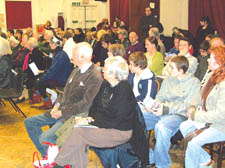|
|
 |
| |

The packed public meeting at the Holy Redeemer Church in Exmouth Market |
‘Taking on government could save historic health building’
Health chiefs are urged to challenge finance rules as campaigners fight on for iconic centre
HEALTH chiefs have been urged to challenge government finance rules they say are forcing them to sell the iconic Finsbury Health Centre to a private developer.
Islington Primary Care Trust (PCT) chief executive Rachel Tyndall told a packed Holy Redeemer Church in Exmouth Market on Thursday that maintaining the Grade I- listed building was “not worth the money”.
The health hub in Pine Street – designed by the internationally renowned architect Berthold Lubetkin – has fallen into a state of disrepair and the PCT plans to sell it to the highest bidder.
Under the plans, which are currently out for consultation, all services will be duplicated in other buildings across Islington.
Ms Tyndall said government rules for health building developments meant any refurbishment package would involve “remortgaging” the site in Pine Street under a Private Finance Initiative (PFI) scheme.
She said: “The government decides if we wish to invest in a building we have to take out a mortgage. The only way we can get substantial funds for rebuilding is working with the private sector companies. I am a servant of the government – I have to accept their rules on this.”
The PFI scheme would mean a company refurbishing the Finsbury Health Centre with the PCT repaying the debt to its private sector “partner”, Camden and Islington Community Solutions Limited (CICSL) over 20 years.
Ms Tyndall, who faced calls for her resignation at the meeting, said an independent team of surveyors had estimated the cost of the PFI scheme would be £400,000 a year in rent – more than the cost of a brand-new building of the same size.
She said: “We think that money would be better spent on staff.”
Both Camden and Islington PCTs hold a 10 per cent stake in CICSL, which is based in Cardiff.
The company is a subsidiary of Community Solutions for Primary Care Ltd, which is owned by property investors Apollo Medical Investments, the construction firm Morgan Sindall Investments and Barclays Bank.
The total bill under the PFI scheme, around £8million, would be more than double the cost of a one-off refurbishment – an amount the PCT is adamant it cannot secure funding for from lottery or heritage groups.
“We have failed to attract that capital,” Ms Tyndall admitted.
But more than 100 people in the meeting – which heard representations from patients, doctors and architectural experts – urged the PCT not to back down so easily.
Leading business expert Dr Richard Sykes was responsible for an £8million restoration of the Grade I-listed modernist architectural icon and arts centre, the De La Warr Pavilion, in Bexhill-on-Sea.
He told the meeting there were ways of avoiding using PFI schemes in public body developments and that the PCT could challenge the government on this.
Dr Sykes said: “There are ways of breaking the PFI scheme. What we did with the De La Warr Pavilion was create a
99-year lease with a social enterprise project attached to it. The not-for-profit capacity meant we could get the capital for the refurbishment.
“What it requires is going to the government and saying the community does not want to work with PFI on this project. There is a shifting atmosphere and there maybe political support for that.”
Ms Tyndall said: “We have no principle objections to that.”
The Finsbury Health Centre was built in 1938. It meant that for the first time in Britain doctors worked alongside health professionals under one roof. It was described by the mayor of the time as the “pride of Finsbury” and, as archive documents unearthed by the Tribune show, actually informed Aneurin Bevan in creating the National Health Service 10 years later.
During the meeting, patients were treated to a history presentation on the centre by Terry Like of Unison.
Wendy Savage, one of the founders of the Keep Our NHS Public Campaign, spoke about the threat of privatisation to the centre.
Labour MP Emily Thornberry, former Islington South and Finsbury MP Chris Smith and councillor Paul Convery sent messages of support to the meeting, organised by patient Barb Jacobson.
The PCT has argued that because of its architectural status, making the building accessible to disabled patients would mean costly improvements. Architectural experts from English Heritage shot down these claims. There is no plan for what would happen to the building if it was sold and questions were raised at the meeting as to who would want to buy it in its apparent state of disrepair.
The last word fell to Dr John Allan, who was Lubetkin’s biographer and personal friend.
He said: “The Finsbury Health Centre is a leading example of the ideals of public service. The idea it might be sold is a shocking testament to the abandonment of those social values.” |
 |
|
 |
| |
| |
| |
|
 |
|